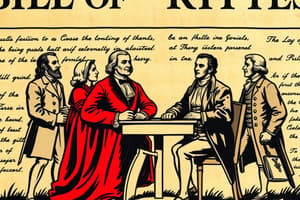Podcast
Questions and Answers
What was one of the motivations for urban artisans and mechanics to support the Constitution?
What was one of the motivations for urban artisans and mechanics to support the Constitution?
Which of the following groups is NOT mentioned as supporting ratification of the Constitution?
Which of the following groups is NOT mentioned as supporting ratification of the Constitution?
What does the quote from "A Citizen of Philadelphia" suggest about the benefits of a Federal treasury?
What does the quote from "A Citizen of Philadelphia" suggest about the benefits of a Federal treasury?
What does the text suggest about the relationship between the interests of merchants and urban artisans and mechanics?
What does the text suggest about the relationship between the interests of merchants and urban artisans and mechanics?
Signup and view all the answers
What point does the author make by citing "Marcus's" adage, "it is the interest of the mechanicks to join the mercantile interest, because it is not their interest to quarrel with their bread and butter"?
What point does the author make by citing "Marcus's" adage, "it is the interest of the mechanicks to join the mercantile interest, because it is not their interest to quarrel with their bread and butter"?
Signup and view all the answers
Which state staunchly refused to adopt paper money or debt relief measures?
Which state staunchly refused to adopt paper money or debt relief measures?
Signup and view all the answers
What was the main reason why South Carolina's land bank system was successful?
What was the main reason why South Carolina's land bank system was successful?
Signup and view all the answers
What was the outcome of the debate over paper money in Pennsylvania, New York, and New Jersey?
What was the outcome of the debate over paper money in Pennsylvania, New York, and New Jersey?
Signup and view all the answers
What is the significance of the statement "Vox Populi Vox Dei" in this context?
What is the significance of the statement "Vox Populi Vox Dei" in this context?
Signup and view all the answers
What does the phrase "legal tender" refer to in the context of this passage?
What does the phrase "legal tender" refer to in the context of this passage?
Signup and view all the answers
What was the main issue driving the conflicts surrounding paper money in the late 18th century?
What was the main issue driving the conflicts surrounding paper money in the late 18th century?
Signup and view all the answers
What was the primary difference between the approaches to paper money and debt relief in Virginia and Massachusetts?
What was the primary difference between the approaches to paper money and debt relief in Virginia and Massachusetts?
Signup and view all the answers
What was the primary reason for Georgia's issuance of £50,000 paper emission in 1786?
What was the primary reason for Georgia's issuance of £50,000 paper emission in 1786?
Signup and view all the answers
In which state did a paper emission result in a 'sweeping victory for debtors' according to Merrill Jensen's description?
In which state did a paper emission result in a 'sweeping victory for debtors' according to Merrill Jensen's description?
Signup and view all the answers
Which of the following was NOT a factor contributing to the depreciation of Georgia's paper emission?
Which of the following was NOT a factor contributing to the depreciation of Georgia's paper emission?
Signup and view all the answers
How did the legal tender status of paper emissions impact the conflict between debtors and creditors?
How did the legal tender status of paper emissions impact the conflict between debtors and creditors?
Signup and view all the answers
What was the primary reason behind the opposition to legal tender status of paper emissions from some segments of the population?
What was the primary reason behind the opposition to legal tender status of paper emissions from some segments of the population?
Signup and view all the answers
Which state's paper emission was initially supported by 'low country residents' and opposed by 'Savannah merchants and mechanics'?
Which state's paper emission was initially supported by 'low country residents' and opposed by 'Savannah merchants and mechanics'?
Signup and view all the answers
How did the management of the North Carolina paper emission contribute to its failure?
How did the management of the North Carolina paper emission contribute to its failure?
Signup and view all the answers
Which of the following states granted legal tender status to paper emissions by 1786?
Which of the following states granted legal tender status to paper emissions by 1786?
Signup and view all the answers
What does the symbol '£' represent in the context of this passage?
What does the symbol '£' represent in the context of this passage?
Signup and view all the answers
What was the core argument of the General Assembly's paper money leader, Abraham Clark, in favor of legal tender paper money?
What was the core argument of the General Assembly's paper money leader, Abraham Clark, in favor of legal tender paper money?
Signup and view all the answers
Who held a differing view on the merits of legal tender paper money compared to the majority of New Jersey farmers?
Who held a differing view on the merits of legal tender paper money compared to the majority of New Jersey farmers?
Signup and view all the answers
What was the intended purpose of the loan office, as argued by its supporters?
What was the intended purpose of the loan office, as argued by its supporters?
Signup and view all the answers
In what way did the supporters of legal tender paper money argue that it would be beneficial to the state, even if it harmed merchants?
In what way did the supporters of legal tender paper money argue that it would be beneficial to the state, even if it harmed merchants?
Signup and view all the answers
How did the Legislative Council initially react to the loan-office bill?
How did the Legislative Council initially react to the loan-office bill?
Signup and view all the answers
What was William Grayson's opinion of the New Jersey loan-office bill?
What was William Grayson's opinion of the New Jersey loan-office bill?
Signup and view all the answers
What does the phrase "domestic circulating medium" refer to?
What does the phrase "domestic circulating medium" refer to?
Signup and view all the answers
What is the significance of the quote "the people (the majority of the people) bear rule, and it is for them to determine w[h]ether a proposition is unjust" in the context of the text?
What is the significance of the quote "the people (the majority of the people) bear rule, and it is for them to determine w[h]ether a proposition is unjust" in the context of the text?
Signup and view all the answers
Why was the issue of legal tender paper money so divisive in New Jersey?
Why was the issue of legal tender paper money so divisive in New Jersey?
Signup and view all the answers
What is the main idea of the text?
What is the main idea of the text?
Signup and view all the answers
What was the Convention's stance on state paper money and debt relief?
What was the Convention's stance on state paper money and debt relief?
Signup and view all the answers
According to the passage, why was the decision to strip states of the power to issue paper money a relatively small gamble?
According to the passage, why was the decision to strip states of the power to issue paper money a relatively small gamble?
Signup and view all the answers
Which of the following statements is TRUE regarding public support for paper money and debt relief during the ratification debates?
Which of the following statements is TRUE regarding public support for paper money and debt relief during the ratification debates?
Signup and view all the answers
What was the correlation observed between geographic areas and support for paper money?
What was the correlation observed between geographic areas and support for paper money?
Signup and view all the answers
What is the significance of dividing the analysis of ratification into two parts: Rhode Island and North Carolina versus the remaining states?
What is the significance of dividing the analysis of ratification into two parts: Rhode Island and North Carolina versus the remaining states?
Signup and view all the answers
How does the passage explain the opposition to the Constitution in Rhode Island?
How does the passage explain the opposition to the Constitution in Rhode Island?
Signup and view all the answers
What is the main point of the passage?
What is the main point of the passage?
Signup and view all the answers
What was the main argument used by North Carolina and Rhode Island in rejecting the Constitution?
What was the main argument used by North Carolina and Rhode Island in rejecting the Constitution?
Signup and view all the answers
How did the Convention's decision on paper money differ from their stance on other issues like voting qualifications?
How did the Convention's decision on paper money differ from their stance on other issues like voting qualifications?
Signup and view all the answers
What aspect of the Constitution did Anti-Federalists challenge most persistently and publicly?
What aspect of the Constitution did Anti-Federalists challenge most persistently and publicly?
Signup and view all the answers
Study Notes
Anti-Federalists' Toughest Challenge
- The article examines the Anti-Federalists' opposition to Section 10 of the US Constitution, specifically regarding paper money and debt relief.
- Historians disagree on the significance of economic factors in the ratification of the Constitution.
- Some argue that economic forces, particularly the interests of creditors, significantly influenced the outcome.
- Others emphasize social, generational, and ideological factors in explaining ratification.
- The author analyzes the role of paper money and debt relief issues in the context of Anti-Federalist arguments against the Constitution.
- The article revisits the role of paper money issues in the ratification debate, arguing it was a significant factor.
- The author contends that the opposition to Section 10 was rooted in the deep divisions over economic policies of the time.
- Anti-Federalist responses to Section 10 varied significantly.
- The author challenges the notion that anti-Federalists were unified in their opposition to Section 10.
- Anti-Federalist positions varied based on local circumstances and priorities.
- Anti-Federalists' concerns about paper currency and debtor relief played a significant role in their opposition, particularly in states such as Rhode Island where the issue was highly contentious.
- Some Anti-Federalists felt that Section 10 violated the principles of republicanism and democracy.
- The debate over Section 10 was deeply intertwined with broader concerns about state sovereignty and the balance of power between the states and the federal government.
- The response from many Anti-Federalists was fragmented and diverse in different states and not unified as one major issue.
- The author highlights differing interpretations of Anti-Federalism and the role of economic factors in the ratification process.
Paper Money and Debt Relief in Early America
- In the mid-1780s, several American states actively managed their economies to deal with financial instability after the Revolutionary War.
- Many states issued paper money and implemented debtor-relief measures
- Some historians argued these measures were beneficial
- Article I, Section 10 of the Constitution prohibited states from issuing paper money or providing debtor relief.
- This significantly altered the balance of power in favor of moneyed interests.
- Colonial paper money issuance, often referred to as "currency finance" and "colonial loan-offices," existed in various forms.
- Some forms involved government borrowing, while others focused on loans by colonial banks.
Ratification Debates
- The debate over the Constitution varied greatly across states, revealing differing priorities among Anti-Federalists.
- In states like Pennsylvania, New York, and New Jersey, paper money and debt issues were highly contested but the majority support toward the Constitution did not change.
- Rhode Island's extreme use of paper money and debt relief laws proved particularly controversial, garnering widespread criticism among other states.
- Concern about the abuse of popular power and its implications for republican government was significant. This concern shaped reactions against extreme actions.
- The author suggests that Federalists exploited Anti-Federalists' differing perspectives and divided loyalties.
- Section 10 of the Constitution was a central point of contention during ratification debates.
- There were significant disagreements among historians over how much weight to give to economic factors in interpreting the ratification process.
Studying That Suits You
Use AI to generate personalized quizzes and flashcards to suit your learning preferences.
Related Documents
Description
This quiz explores the Anti-Federalists' challenges related to Section 10 of the US Constitution, focusing on their opposition to paper money and debt relief. It delves into the economic, social, and ideological factors that influenced the ratification debates. Test your knowledge of the key arguments and historical context surrounding this significant issue.




